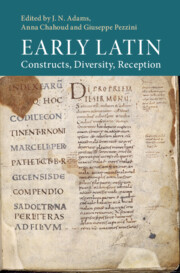Book contents
- Early Latin
- Early Latin
- Copyright page
- Dedication
- Contents
- Illustrations
- Tables
- Contributors
- Acknowledgements
- Abbreviations
- Chapter 1 Introduction: What Is ‘Early Latin’?
- Part I The Epigraphic Material
- Part II Drama
- Part III Other Genres and Fragmentary Authors
- Part IV Reception
- Chapter 20 ‘Early Latin’ and the Fragments of Atellane Comedy
- Chapter 21 Lucretius and ‘Early Latin’
- Chapter 22 Cicero and Early Dramatic Latin
- Chapter 23 Early Latin Texts in Livy
- Chapter 24 Pliny Rewrites Cato
- Chapter 25 Gellius’ Appreciation and Understanding of ‘Early Latin’
- Chapter 26 Views on ‘Early Latin’ in Grammatical Texts
- Chapter 27 Nonius Marcellus and the Shape of ‘Early Latin’
- Chapter 28 ‘Early Latin’ to Neo-Latin
- Chapter 29 Conclusions
- Bibliography
- Index Verborum
- Index of Non-Latin Words
- Index Locorum Potiorum
- Subject Index
Chapter 23 - Early Latin Texts in Livy
from Part IV - Reception
Published online by Cambridge University Press: 27 July 2023
- Early Latin
- Early Latin
- Copyright page
- Dedication
- Contents
- Illustrations
- Tables
- Contributors
- Acknowledgements
- Abbreviations
- Chapter 1 Introduction: What Is ‘Early Latin’?
- Part I The Epigraphic Material
- Part II Drama
- Part III Other Genres and Fragmentary Authors
- Part IV Reception
- Chapter 20 ‘Early Latin’ and the Fragments of Atellane Comedy
- Chapter 21 Lucretius and ‘Early Latin’
- Chapter 22 Cicero and Early Dramatic Latin
- Chapter 23 Early Latin Texts in Livy
- Chapter 24 Pliny Rewrites Cato
- Chapter 25 Gellius’ Appreciation and Understanding of ‘Early Latin’
- Chapter 26 Views on ‘Early Latin’ in Grammatical Texts
- Chapter 27 Nonius Marcellus and the Shape of ‘Early Latin’
- Chapter 28 ‘Early Latin’ to Neo-Latin
- Chapter 29 Conclusions
- Bibliography
- Index Verborum
- Index of Non-Latin Words
- Index Locorum Potiorum
- Subject Index
Summary
Livy, following a tradition established in Latin historiography at least by the early 1st century, frequently employed archaisms in his narrative. In addition, on a number of occasions he quotes what purport to be texts dating from the period of the events narrated, most of them containing language recognisable as early Latin. This chapter will consider three of these in detail: (i) 22. 10. 2-6. The terms of the vow of a uer sacrum approved by the people in 217 BC, part of the expiations following the disastrous defeat by Hannibal at Lake Trasimene. (ii) 25. 12. 5-6, 9-10. The carmina Marciana, predictions said to have been made by the seer Marcius, which came to light in 212 BC (for the second passage Macrobius 1.17.28 constitutes an indirect tradition for the text). (iii) 40. 52. 5-6. The tabula triumphalis of M. Aemilius Regillus, affixed to the temple of the Lares permarini dedicated in 179 BC but commemorating his victory over the Seleucid fleet at Myonnesus in 190. The authenticity of these texts, Livy’s sources, and the linguistic phenomena they contain are discussed. The chapter also tabulates a number of other passages with a claim to derive from the time of the events narrated.
- Type
- Chapter
- Information
- Early LatinConstructs, Diversity, Reception, pp. 466 - 484Publisher: Cambridge University PressPrint publication year: 2023



